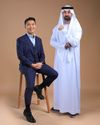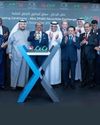
Most of the top family-owned businesses in the Middle East either started off as dealers, agents, or distributors for international companies, with the most successful enterprises evolving by adding more services and sectors to their portfolios. However, recently more family businesses seem to be looking to access the region’s stock exchanges for growth. In our 2023 list of the Top 100 Arab Family Businesses, over 60% are major shareholders in a company listed on a regional stock exchange. Most of these listed companies’ family businesses were among the founding shareholders. These listings not only bring in capital but allow family members to unlock value, as well as improve transparency and governance.
While there are now female board members in most family businesses in the Middle East, almost all the heads are still men. Only four of the top 100 family businesses have women leaders. Most of the companies on our list have stood the test of time, with six of the entries established in the 1800s.
Saudi Arabia dominates with 33 entries and is home to four of the top 10 companies. The U.A.E. comes in close second place with 29 entries, followed by Egypt with nine, and Qatar with eight. Family businesses have also begun investing in startups, with the Mansour and Abdel Latif Jameel families investing in global startups. The Tamer Group acquired Mumzworld, a childcare e-commerce company, in 2021.
Diese Geschichte stammt aus der August 2023-Ausgabe von Forbes Middle East - English.
Starten Sie Ihre 7-tägige kostenlose Testversion von Magzter GOLD, um auf Tausende kuratierte Premium-Storys sowie über 8.000 Zeitschriften und Zeitungen zuzugreifen.
Bereits Abonnent ? Anmelden
Diese Geschichte stammt aus der August 2023-Ausgabe von Forbes Middle East - English.
Starten Sie Ihre 7-tägige kostenlose Testversion von Magzter GOLD, um auf Tausende kuratierte Premium-Storys sowie über 8.000 Zeitschriften und Zeitungen zuzugreifen.
Bereits Abonnent? Anmelden

CONSCIOUS INVESTING
VentureSouq's cofounders and general partners, Suneel Gokhale, Sonia Gokhale, Tammer Qaddumi, and Sonia Weymuller, are actively reshaping the investment landscape. With $250 million in assets under management, the thematic fund manager is forging a distinct path, with a focus on fintech and climate tech.

VENTURING BEYOND CAPITAL
In just seven years, Shane Shin and Mahmoud Adi, Founding Partners of Shoroog Partners, have turned their startup into one of the Middle East’s biggest startup investors, with 500 million in assets under management. With ambitions far beyond venture capital, they’re now expanding further into credit markets and looking at where they can be pioneers.

ROCK STAR
WHAT IF THE REVOLUTIONARY TECHNIQUES DEVELOPED TO FRACK ROCKS FOR OIL COULD BE MODIFIED TO UNLOCK LIMITLESS CLEAN ENERGY FROM THE HEAT OF THE EARTH’S CRUST?

Breaking New Territory
Moroccan-Canadian singer and 30 Under 30 alumna Faouzia is having her biggest year yet and enjoying newfound fame in China. As her stardom rises, she’s now exploring new projects and possibilities.

5 Biggest MENA IPOs of 2024
This year has been pivotal for MENA, marked by a series of high-profile IPOs that drew interest from local and international investors. Here’s a look at the five biggest IPOs that defined 2024.

TOP VENTURE CAPITALISTS
MENA has emerged as a vibrant hub for innovation and entrepreneurship, fostering a dynamic landscape for startups.

Top Funding Rounds in MENA 2024
This year has seen some of MENA’s largest-ever funding rounds. Here’s a look at five standout deals. Only startups that were founded less than 10 years ago and had disclosed their funding rounds as of November 27, 2024, were considered.

Key Insights From MENA's Funding Landscape
MENA saw a mixed performance in the first nine months of 2024.

A Look Ahead: Travel Trends Shaping 2025
What will drive wanderlust in 2025? Here’s a look at the key travel trends set to dominate the year.

Codebreakers
Backed by 200 million in funding, 28-year-old SCOTT WU and his team of competitive coders at Cognition are building an Al tool that can program entirely on its own, potentially disintegrating the whole industry. Is its 2 billion valuation the result of a true breakthrough, or just more Al hype?